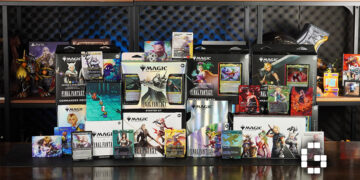If you are a gamer in Southeast Asia, you might have heard of GameStart. Being one of the most awaited gaming conventions in Southeast Asia, GameStart Asia showcased everything gaming-related. Its 4th edition will be held on 14 & 15 October 2017 at Singapore’s Suntec Convention Centre. GamerBraves was honoured to interview Ms Elicia Lee, the organiser of GameStart Asia for a little talk about this gaming convention.

Q: What motivates you to start GameStart?
I’m a gamer, and when I was working in EA, was exposed to all these amazing game events around the world, like E3, Tokyo Game Show and Gamescom. Southeast Asia was always pretty neglected since it’s a smaller market than the US or EU, but from holding small EA fan events, I saw that we had tons of passionate gamers here, who didn’t have the opportunity to travel to attend the big overseas events (including myself). After I left EA, I decided to create a gaming event that I as a gamer, would want to attend. I was also sick of people telling me that the gaming market in Singapore and SEA were a low priority, so I wanted to prove that we had a super passionate, active gaming community here, and in 2014, 12,000 other gamers proved me right.
My objective now is for GameStart to be a key event for gamers as well as the professionals in the gaming industry, not just in Singapore, but across Southeast Asia.
Q: GameStart is Singapore’s largest gaming convention. Is it difficult to put such an event together? What kind of process does it involve?
GameStart is a true labour of love. It’s a hard work and can be both mentally and physically taxing, but the positive feedback we get from visitors and seeing people enjoy the event makes it all worthwhile.
We do a post-mortem after every event to evaluate what went well and what didn’t, and take in feedback from our exhibitors, partners, and visitors. We then start our planning for the next year, a couple months after the event is finished, working out floorplan, programs, which guests to invite etc. Compared to most events, GameStart is quite involved with our exhibitors and partners, so we actively work with them to coordinate and plan how to maximise their content at the show. We also run our own content in collaboration with local communities, such as Retro DNA, cosplay and Doujin Market with Neo Tokyo Project, and our annual FIFA tournament. We usually start our marketing and PR about three months before the event, with a heavy focus on social media. Putting the actual event together requires a lot of logistics and coordination, schedule planning, manpower management, stage rehearsals, guest management and more.
Ironically, I tend to miss seeing a lot of content during GameStart, because the team is usually busy running around and ensuring things are running smoothly.

Q: What was the biggest challenge you faced in the history of organising GameStart?
I think the biggest challenge, especially in the first couple of years, was convincing jaded game companies of GameStart’s potential and gaining their buy-in. A lot of people were sceptical that a game convention would work in Singapore, and some others had been burnt by previous events. So my team has had to work very hard at proving ourselves over the last four years. This is also why I have eternal gratitude toward all the exhibitors, communities and partners who took the risk and supported the first GameStart event. Without them, GameStart might not be here today.
Q: GameStart’s target audience is mainly Asia, have you considered holding it in other countries such as Malaysia or Thailand?
We definitely have plans to move out into the region but are still considering our next steps. If things go well, we could have something to announce within the year ?
Q: In your opinion, what are the key differences between gaming conventions in Singapore/Malaysia versus the rest of the world? What can local gaming events learn from overseas events?
Each gaming convention is a bit different, depending on the country its in and the audience it caters for. I haven’t been to any gaming events in Malaysia, but from what I hear, they are similar to Singapore in that they are more community-focused, with strong community support. The larger conventions overseas tend to be run by corporate entities, who are more focused on bringing in triple A exhibitors and have less community content. Culturally, I’ve observed that conventions in our region tend to lean more towards Asian and Japanese style games, but that could be because those publishers are more willing to invest in events here compared to the Western ones.
There are a lot of things we can learn from other events, which range from operational processes like ticketing and queuing, to program planning, marketing, and general event management. GameStart takes inspiration from conventions like Tokyo Game Show, Taipei Game Show and PAX, and we localise it for South-east Asian gamers.
Q: What are your views on the various first-party platforms (PS4, Xbox One, Switch) relative to the gaming market as a whole?
I think they are a key part of the overall gaming ecosystem, and provide a gaming experience that other platforms cannot. Especially in Asia, a lot of people driving the games industry today, all grew up playing console games, and this shaped who we are and our love for gaming. I would love to see all three companies do well, which will benefit both the industry and gamers overall.
Q: How do you and your team support indie developers?
One of the objectives for GameStart is to support and help highlight talent and creators from Southeast Asia. Through our Founders Base area, we offer heavily subsidised booths for indie developers to exhibit and show their games at the event. We also work with the Info-communications Media Development Authority (IMDA) to offer developers under their PIXEL Studios incubation program the opportunity to show their games at GameStart. We also have a partnership with Taipei Game Show, where we host indies from Taiwan at GameStart and likewise, they host indies from Singapore who are keen to reach the Taiwan market.
In 2016, we also organised an indie pitch session, where indies from the region had the opportunity to pitch their games to two Japanese publishers – Bandai Namco Entertainment Asia and DMM Games.
I am constantly looking for new avenues to help promote developers from our region, as I’ve seen some awesome games made here, but many do not have the opportunity to showcase them to a larger audience.

Q: We’re aware that GameStart Asia has worked with major players like Sony Playstation for past events. Are there any notable exhibitors or events taking place at GameStart this year?
Unfortunately, we’re still quite early in the planning stages now so I can’t announce any names, but I am confident that a large number of last year’s exhibitors will return this year, and we’re in talks with some new exhibitors as well.
GameStart 2017 highlights (for now):
- We will have a larger space this year (3 halls compared to 2 halls in 2016).
- The consumer exhibition will be 2 days this year (compared to 3 last year), on 14 & 15 October.
- We will be organising a B2B programme on 13 October, in partnership with with a well established international awards organiser, in conjunction with GameStart.
- We will have an analogue gaming area this year (card and board games).
- South East Asia Major, the region’s largest fighting game tournament, will return to GameStart.
- Doujin Market will also be returning to GameStart, in partnership with Neo Tokyo Project.
More details will be announced in the coming months!
Q: When can interested gamers purchase tickets to this year’s event, and where is the best place to do so?
We will launch our early bird tickets online around July/ August, so do check our website and Facebook page for updates. Standard tickets will be available from our website and selected retailers in Singapore, as well as at the door during the event. Q: Any words of advice to gamers who wish to break into the gaming industry?
Q: Any words of advice to gamers who wish to break into the gaming industry?
Do research on what you’d like to do, and what experience and skills are required. There is a lot of opportunity in the gaming industry now, as more overseas companies open offices in Southeast Asia, and the indie development scene is also growing very quickly. Networking and community events are also a great way to make contacts in the industry.
Thanks Elicia for giving us some insights on gaming events!! Previously working in EA Singapore’s online team, Elicia Lee left EA Singapore for her own marketing agency, Zombits before starting to organise GameStart Asia. GameStart Asia’s 4th edition is just a few months away, check out their website or Facebook page for updates if you are interested!
If you want to read the Chinese version of the interview, please head over to Wanuxi!










![[EXCLUSIVE] Inside Japan’s Indie Game Revolution – An Interview with BitSummit Organizer Masahiko Murakami](https://cdn.gamerbraves.com/2025/05/BitSummit-Orgainzer_Interview_FI-360x180.jpg)
![[EXCLUSIVE] The Art of Adaptation: Developer Interview Details the OVERLORD Mobile RPG Lord of Nazarick](https://cdn.gamerbraves.com/2025/05/Lord-of-Nazarick_Interview_FI-360x180.jpg)
![[EXCLUSIVE] Taking Gundam in Bold New Directions – Interview with GQuuuuuuX Director Kazuya Tsurumaki](https://cdn.gamerbraves.com/2025/04/Kazuya-Tsurumaki_Interview_FI-1-360x180.jpg)


![[SEA Exclusive] From Shadows to Shipwrecks – Jennifer English Talks About Bringing Emotional Depth to Clair Obscur: Expedition 33](https://cdn.gamerbraves.com/2025/04/Clair-Obscur-Jennifer-English_Interview_FI-360x180.jpg)

![[EXCLUSIVE] Do the Game Interview – An Intimate Look at the Challenges of Game Development](https://cdn.gamerbraves.com/2025/04/Do-the-Game_Interview_FI-1-360x180.jpg)
![[EXCLUSIVE] Interview with the Minds Behind of Den of Wolves – 10 Chambers’ New Sci-Fi Heist FPS](https://cdn.gamerbraves.com/2025/04/Den-of-Wolves_Interview_FI-360x180.jpg)








